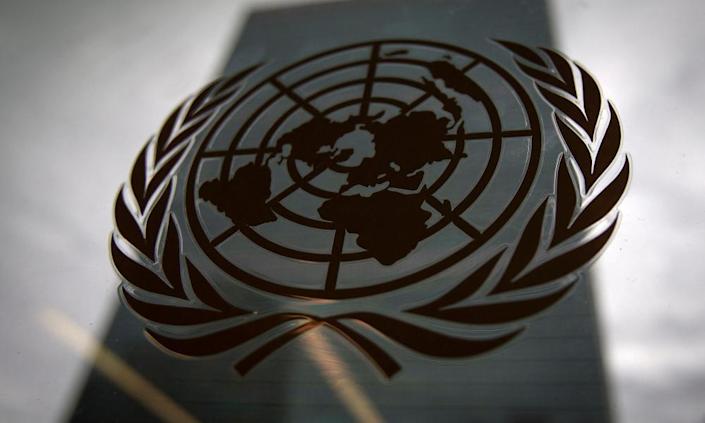The United Nations security council met earlier this month at Russia’s request, to discuss Moscow’s claims that the US is funding “military biological activities” in Ukraine – in other words, secretly developing biological weapons in Ukrainian laboratories.
Related: Russia makes claims of US-backed biological weapon plot at UN
The event incited heated discussion. The Russian ambassador to the UN, Vasily Nebenzya, evoked the specter of an “uncontrolled spread of bio agents from Ukraine”. His American counterpart, Linda Thomas-Greenfield, warned that Russia’s claim could be a pretext for launching its own biological weapons attack on Ukraine.
So what is the dispute all about, and what is actually happening inside Ukraine?
How did ‘bio labs’ become the latest front in the Ukraine information war?
Earlier in March, the Russian ministry of foreign affairs posted a tweet accusing the US and Ukraine of running a secret “military-biological programme” inside the stricken country. Moscow claimed its invading forces discovered evidence of an “emergency clean-up”.
Moscow went on to claim that it had found documents related to the secret US operation in laboratories in Kharkiv and Poltava.
The allegations were quickly amplified by China, which supported the claims during the UN security council debate. The theory took on a life of its own on social media under the hashtag #usbiolabs, and found a welcome home among rightwing outlets in the US including the War Room podcast of Donald Trump’s former adviser Steve Bannon and the Fox News primetime show hosted by Tucker Carlson.
How have the US and Ukrainian governments responded?
Both the US and Ukraine have categorically denied they are developing biological weapons inside the country. Thomas-Greenfield said: “I will say this once: ‘Ukraine does not have a biological weapons program.’” She went on to turn the accusation back on Moscow. “It is Russia that has long maintained a biological weapon program in violation of international law.”
Ukraine’s ambassador to the world body, Sergiy Kyslytsya, called the idea being advanced by Russia “a bunch of insane delirium”.
This week, speaking to business leaders in Washington, Joe Biden warned that Vladimir Putin could use biological weapons.
“His back is against the wall,” said Biden, mentioning the false claims about US-funded biolabs in Ukraine. “Now he’s talking about new false flags he’s setting up, including he’s asserting that, we, in America, have biological as well as chemical weapons in Europe. Simply not true, I guarantee you.”
What are independent world bodies saying?
The World Health Organization (WHO) has said it is unaware of activity by Ukraine violating any international treaty, including the ban on biological weapons.
The UN high commissioner for disarmament, Izumi Nakamitsu, confirmed that the UN was not aware of any biological weapons programmes in Ukraine. Nakamitsu pointed to the Biological Weapons Convention, which has prohibited the development and use of biological weapons since 1975. The convention was backed by Richard Nixon, who in 1969 also put a stop to the US developing its own offensive biological weapons.
So do bio labs exist inside Ukraine, and is the US supporting them?
Yes, and yes. Ukraine does operate biological laboratories that receive US funding. The US undersecretary of state Victoria Nuland affirmed those facts in a Senate foreign relations committee hearing this week, in which the Republican senator Marco Rubio asked directly if Ukraine had biological weapons.
Nuland did not answer the question head on. “Ukraine has biological research facilities,” she said, adding that there was concern that Russian forces were trying to gain control of the labs. “We are working with the Ukrainians on how they can prevent any of those research materials from falling into the hands of Russian forces.”
Nuland’s comments were seized upon by far-right commentators as evidence of a secret plot. In fact, US funding to the laboratories had its roots in the fall of the Soviet Union, after which money was pumped into Ukraine and other countries to help them transfer scientific skills away from weapons towards public health.
The scheme was originally known as Cooperative Threat Reduction (CTR) but is now more commonly referred to as biological engagement. It has been successful in helping former Soviet and other countries fulfill public health obligations.
“This is one of the best things that we do,” Dr Gigi Gronvall, senior scholar at Johns Hopkins Center for Health Security, told the Guardian.
Most of the work of the Ukraine labs today, Gronvall said, involves surveillance of diseases in animals and people as an early-warning system for illnesses such as African swine fever, which is endemic in the region.
“We know pathogens don’t respect borders, so helping to put out public health fires before they become too big is an advantage to all of us,” she said.
Do the Ukraine laboratories store dangerous biological agents?
As part of their work the labs do seem to hold dangerous pathogens. We know that because WHO is urging Ukraine to destroy any highly dangerous agents to avoid the risk of a disastrous outbreak should one of the labs be hit by Russian forces.
“As part of this work, WHO has strongly recommended to the ministry of
health in Ukraine and other responsible bodies to destroy high-threat
pathogens to prevent any potential spills,” the UN health agency said.
The WHO has worked in Ukraine for several years helping bio labs improve safety and security, so it knows what it is talking about.
If Russian claims of a secret bioweapons programme are fake news, does that mean there is nothing to worry about?
No. In addition to the threat of pathogens held in Ukrainian labs leaking or falling into the hands of Russian forces, there is the threat of Russia launching its own biological weapons attack. The assessment of the US state department is that Russia continues to maintain an offensive biological weapons programme in violation of the convention it signed.
Earlier this week, the White House press secretary, Jen Psaki, accused Russia under Putin of having a “long and well-documented track record” of using chemical weapons, pointing to the poisoning of the opposition leader Alexei Navalny and Russia’s support of the Syrian regime while it deployed chemical weapons.
She warned that Moscow’s claim of a secret biological weapons programme in Ukraine could in fact be laying the foundations for a Russian chemical or biological weapons assault.
On Monday, Biden said Russia was “also suggesting that Ukraine has biological and chemical weapons in Ukraine … That’s a clear sign he is considering using both of those.
“He’s already used chemical weapons in the past, and we should be careful of what’s about to come. He knows there’ll be severe consequences because of the united Nato front but the point is: it’s real.”
That possibility leaves even seasoned experts rattled.
“I hope that this is more of a disinformation talking point than an actual thing,” Gronvall said. “I guess we shall see.”




